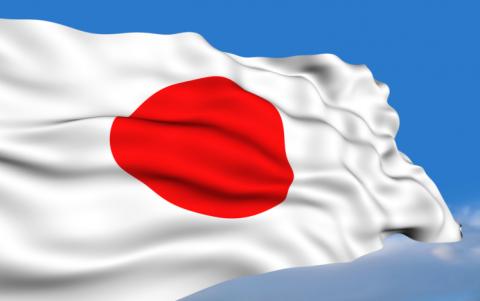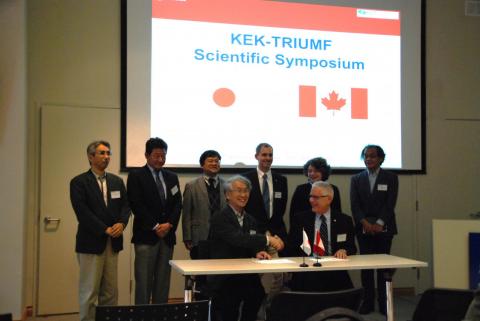

On October 10-11, 2013, TRIUMF hosted the fourth joint Japan-Canada Symposium on Accelerator-based Science. Organized by Japan's KEK laboratory and TRIUMF, the symposium alternates between countries and takes place biennially. With a focus on common science and complementary capabilities, this year's symposium included a formal ceremony to renew the five-year partnership agreement between the two laboratories.
KEK, known in English as the High Energy Accelerator Research Organization, is Japan's premier laboratory for accelerator-based science. It conducts research in materials science, particle and nuclear physics, and life sciences. Established in 1997 in a reorganization of the Institute of Nuclear Study, University of Tokyo (established in 1955), the National Laboratory for High Energy Physics (established in 1971), and the Meson Science Laboratory of the University of Tokyo (established in 1988), KEK serves as a center of excellence for domestic and foreign researchers, providing a wide variety of research opportunities. In addition to the activities at the Tsukuba Campus, KEK now jointly operates a high-intensity proton accelerator facility (J-PARC) in Tokai, together with the Japan Atomic Energy Agency (JAEA). Over 600 scientists, engineers, students, and staff perform research activities on the Tsukuba and Tokai campuses. KEK attracts nearly 100,000 national and international researchers every year, and provides world-class research facilities and opportunities to many students and post-doctoral fellows each year.
The two-day symposium highlighted a half-dozen areas where collaboration is blossoming and identified new opportunities for enhanced partnership. Jim Hanlon welcomed the visiting delegation and put the symposium in context for the audience of about 60 scientists and students participating in the symposium: in the past year, TRIUMF has established its first two international jointly appointed positions with Japan and a TRIUMF post-doctoral fellow was selected to announce the Japan-based T2K collaboration's break-through results in Stockholm. Reiner Kruecken gave an overview of TRIUMF's present research activities, highlighting the 25 year formal history between the two laboratories that included a 1989 visit by the Japanese prime minister to open the M9 muon beamline for materials science at TRIUMF. As a trustee of KEK, Okada-san provided an overview of KEK's research program and highlighted the development of accelerators and the progress in materials science, particle and nuclear physics, and life sciences.
The flagship collaboration among KEK, TRIUMF, and Osaka University's RCNP lab, is the ultra-cold neutron facility. With substantial Japanese investment and support from the Canada Foundation for Innovation, the project will develop world-leading capability at TRIUMF to allow the international research team to explore fundamental features of the neutron. The University of Winnipeg leads the Canadian team. Masuda-san from RCNP and Rudiger Picker from TRIUMF summarized the status of the project.
In pairs of subsequent talks, the two labs presented updates on activities in materials science and accelerator science. The first day of the symposium concluded with high spirits, enthusiastic discussion, and some jet lag.
The second day of the symposium included discussions of joint projects such as the T2K collaboration's long-baseline neutrino experiment (of which Canada was a founding member), the ATLAS experiment at CERN, and the Belle-II experiment at KEK's Super KEK-B accelerator. A few emerging projects at the J-PARC facility were highlighted with discussions of mu-to-e conversion, muon g-2 measurement, and KEK's expanding efforts in rare-isotope physics.
After lunch, a formal ceremony was held to sign a five-year Memorandum of Understanding between the two laboratories. Atsuto Suzuki, Director General of KEK, presented a model for developing a bilateral common platform as a next level of enhanced international partnership. A small working group was created to discuss the implementation between KEK and TRIUMF.
The afternoon of the second day focused on working parallel sessions on the key opportunities in materials science, rare-isotope physics, accelerator science and technology, b-quark physics with Belle-II, and ultra-cold neutrons. A formal banquet hosted by TRIUMF on Friday evening concluded the symposium.
TRIUMF salutes its Japanese colleagues and thanks them all for the productive and engaging visit. We look forward to the emergence of a strong bilateral platform in support of our common strengths!
NOTE: The full agenda and presentations can be accessed via InDiCo.
-- by T.I. Meyer, Head of Strategic Planning & Communication, TRIUMF
